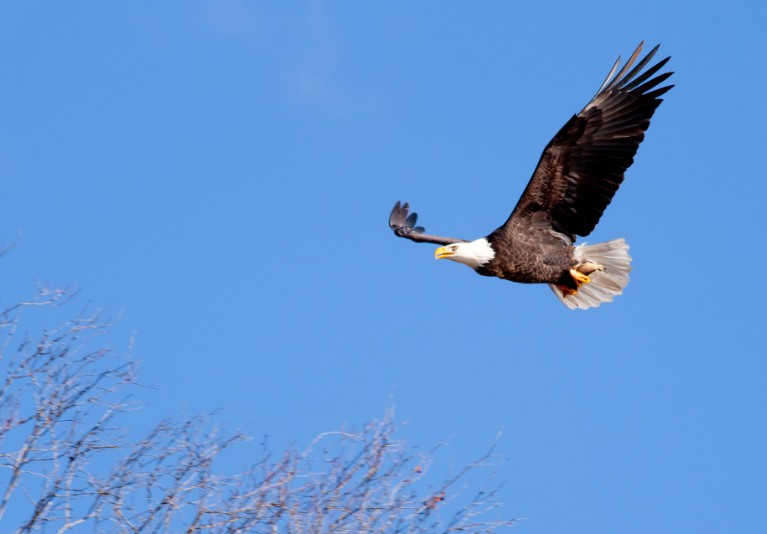Wonders of Creation
Majestic Vultures: Facts, Ecology, and Spiritual Meaning
Learn how vultures clean nature, raise their young with devotion, and symbolize divine protection in Jewish thought
- Rinat Shahar
- |Updated

The vulture is one of the largest and most impressive of the birds of prey. Its body length reaches about 1.1 meters (3.6 ft), and its wingspan extends up to 2.7 meters (almost 9 ft). The vulture is the bird of prey mentioned most often in Tanach. It appears at the top of the list of non-kosher birds (Vayikra 11:13; Devarim 14:12) and symbolizes strength, speed, and swiftness.
Because it feeds only on carcasses, the vulture serves as nature’s sanitation worker, cleaning the land of dead animals and preventing the spread of disease and epidemics. Its presence in the ecosystem is therefore of great importance.
The vulture requires a relatively warm climate, and so it lives in Mediterranean, steppe, and desert regions. It prefers mountainous landscapes with high cliffs.
Because it eats carcasses, the Creator designed the vulture’s body perfectly for this purpose: its beak is large, strong, and sharp — capable of tearing through the hide of a carcass and ripping off chunks of meat. Its long neck enables it to reach deep into carcasses through narrow openings in the skin. Because its head and neck are nearly bald, blood and bits of flesh do not stick to them.
The vulture is the first to feed on a carcass. Only after it finishes its meal can smaller, weaker scavengers partake.
A vulture's eyesight is extraordinary, and it can spot a carcass from as far as 7 km (4.3 miles) away! From an altitude of 1 km above ground, a vulture can easily scan the terrain. It soars effortlessly at 60 km/h (37 mph) without flapping its wings, and when it sees prey, it can dive at 140 km/h (87 mph). Other vultures, noticing the sudden dive, quickly follow to the feast. In contrast, its sense of smell is not well developed, and it often relies on other animals to locate carcasses.
Its large crop (an expansion of the esophagus) allows the vulture to eat enormous amounts of food and survive on it for days. A vulture that hasn’t eaten for a week can consume more than a kilogram of meat in one sitting. After such a meal, it struggles to take off and may stay near the carcass for a day or more.

Mated for Life
Once a vulture finds a mate, they remain loyal for life. Together they build a nest out of branches cut with their beaks, lining it with grass. The female lays only one egg, and both parents take turns incubating it.
The chick hatches with eyes open and covered in white down. Both parents feed it from their beaks with partially digested food from their crops. By one month, the chick begins to feed directly by placing its beak into the parent’s throat. Later, the parents regurgitate food into the nest, and the chick eats on its own.
During feeding, the parents crack bones to provide calcium for the chick’s growing skeleton.This instinct reflects the wisdom built into nature.
Throughout its development, the chick cries frequently for food. The parents brood it for warmth until about six weeks old and never leave it alone until around 70 days. At 80–90 days, the young vulture can take short flights, but full independence is at between 100–125 days.
Vultures in Israel
Until about 100 years ago, thousands lived across the land. The widespread introduction of firearms however, led to uncontrolled hunting of birds of prey, including vultures.
The most devastating blow came about with the use of agricultural pesticides, and vultures feeding on poisoned carcasses were quickly killed. Together with food shortages in the Negev and Judean Desert, disturbance from human development, hikers, gliders, and aircraft (both military and civilian), the result was the near-extinction of vultures in Israel.
Surveys by the Israel Nature Reserves Authority and the Society for the Protection of Nature reveal that in the last two decades, no more than 130 breeding pairs have been recorded in the country. In recent years, only about 60 nesting pairs remain. This drastic decline is a severe warning that without urgent conservation efforts, vultures may disappear from Israel completely.
On Eagles’ Wings
In the Song of Haazinu, God promises that if we keep His commandments, He will protect us like a vulture: “As a vulture stirs up its nest, hovers over its young” (Devarim 32:11). Why specifically vultures? Unlike other birds that carry their chicks in their claws, fearing an attack from above, the vulture carries its chicks on its wings. No bird flies higher than it. The only threat is from humans shooting arrows, and the vulture seems to say: “Better the arrow strike me than my young.”
So too, God acted for Israel: “The angel of God… came between the camp of Egypt and the camp of Israel” (Shemot 14:19). The Egyptians shot arrows and stones, and the protective cloud absorbed them. To this day, God shields and guards us, for “He who watches over Israel neither slumbers nor sleeps.”

